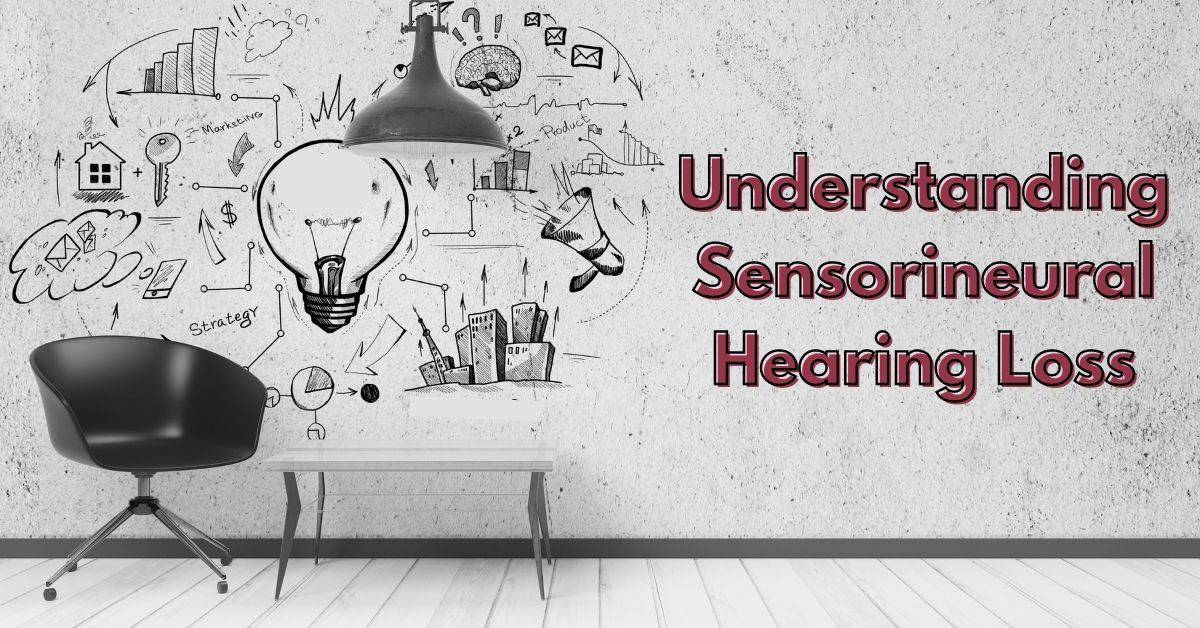- Pesticides Affect Hearing in Farmers - September 2, 2024
- Hearing Loss is #1 Disability for Veterans - August 1, 2024
- Untreated Hearing Loss linked to Dementia - July 1, 2024
Hearing loss is a pervasive medical condition that over 40 million people experience in the U.S. There are three main types: sensorineural, conductive, and mixed hearing loss. Sensorineural hearing loss is the most common form of impaired hearing, accounting for 90% of the hearing loss that people have. It is a permanent health condition that reduces a person’s ability to hear and process sound.
If left untreated, this can significantly impact daily life and capacity to manage personal and professional responsibilities with ease. It is incredibly important to be aware of the symptoms and be proactive about your hearing health! Early intervention can drastically improve hearing as well as overall health and well-being!
Sensorineural Hearing Loss
The auditory system is responsible for how we hear and consists of: the outer/middle/inner ear, nerve pathways, blood vessels, and auditory cortex in the brain. Damage to any of these parts can result in different types of hearing loss that range from mild to severe. Sensorineural hearing loss specifically results from damage of the hair cells in the inner ear and/or the auditory pathways that go from the ear to the brain.
These components are integral for processing sound. There are thousands of hair cells in each ear which help convert soundwaves into electrical signals. These signals then travel to the brain, via nerve pathways, where they are processed; this allows us to understand the sound we hear. When the hair cells and/or nerve pathways are damaged, their capacity to convert and carry sound information is disrupted. This makes it difficult for the brain to then process incoming sound, causing hearing loss.
Causes of Sensorineural Hearing Loss
There are several factors that can contribute to the development of sensorineural hearing loss. Common factors include the following:
- Environmental exposure to loud noise: one time or consistent absorption of loud noise can cause noise induced hearing loss. Sound is measured in decibels (dB) and noise above 85dB is considered potentially harmful for hearing. People can easily be exposed to increased levels of noise in the workplace, during recreational activities, and by using personal audio devices.
- 24% of hearing loss is caused by loud noise in the workplace (CDC)
- Nearly 50% of people (ages 12-35) globally, listen to unsafe levels of sound through audio devices (WHO)
- Aging: age related hearing loss (known as presbycusis) is a result of the natural aging of the auditory system – changes to bones, cumulative toll of sound exposure, medications etc. The risk of hearing loss increases with age, people ages:
- 65-74: 25% have hearing loss
- 75 and older: 50% have hearing loss
- Existing medical conditions: such as cardiovascular disease, hypertension, and diabetes increase the risk of hearing loss. These conditions impact blood flow and circulation, the health of vessels and arteries etc. which facilitate the processing of sound in the ear.
- Head/Neck injuries: there are up to 3 million head injuries that occur every year (CDC); most commonly caused by car/bike accidents, falls, and objects that strike the head. These injuries involve extreme force to the head which can damage any of the parts involved in the auditory system.
Other causes include certain medications and chemicals, viral infections, and tumors which can all impact the auditory system as well.
Symptoms of Sensorineural Hearing Loss
Sensorineural hearing loss causes sounds to be unclear and makes volume challenging. People can experience:
- Difficulty understanding speech, especially in environments with background noise
- Loud sounds are too loud and soft sounds are too quiet to hear
- Frequently increasing the volume on electronic devices
- Asking others to speak loudly and/or repeat themselves often
It is important to have your hearing checked as soon as you recognize any changes. Identifying and treating hearing loss early, can really help your transition to enhanced hearing health.
Treating Hearing Loss
The first step is simple! It only involves scheduling an appointment for a hearing test. Conducted by a hearing healthcare specialist, hearing tests measure your ability in both ears. This identifies any hearing loss and the degree of impairment you may be experiencing.
Fortunately, there are effective ways hearing loss is treated. The most common treatment for sensorineural hearing loss is hearing aids. These electronic devices are designed to help amplify and process sound which can significantly increase your ability to hear; improving your daily life and overall health!
If you’ve been struggling to hear, contact us today to schedule an appointment.

